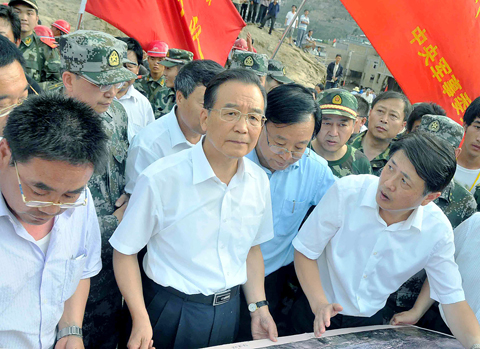China has to pursue political reform to safeguard its economic health, Chinese Premier Wen Jiabao (溫家寶) said during a visit to the booming town of Shenzhen, Xinhua news agency reported.
Wen’s call for political reform lacked specifics, but his comments reflect broader worries that unless the Chinese Communist Party (CCP) embraces at least limited reforms to make officials more answerable, then corruption and abuses may erode the country’s economic prospects.
“Without the safeguarding of political restructuring, China may lose what it has already achieved through economic restructuring and the targets of its modernization drive might not be reached,” Wen was quoted by Xinhua as saying. “People’s democratic rights and legitimate rights must be guaranteed. People should be mobilized and organized to deal with, in accordance with the law, state, economic, social and cultural affairs.”

PHOTO: AFP
Wen said he also wants to “create conditions” to allow the people to criticize and supervise the government as a way to address “the problem of over-concentration of power with ineffective supervision.”
Wen has developed a reputation as the member of CCP leadership most sympathetic to relaxing some of the country’s top-down controls.
Wen will retire as premier in early 2013. He has used recent speeches and comments to indicate that he wants to spend his final years in office focused on improving social welfare, promoting more balanced and equitable economic growth, and addressing public discontent with the government.
In Shenzhen, a small village that has exploded into a city of 14 million people in the last three decades, Wen said the Shenzhen story showed that reforming and opening up to the outside world “is the only road to achieving national prosperity and the people’s happiness.”
“Regression and stagnation will not only end the achievements of the three-decade-old reform, the opening-up drive and the rare opportunity of development, but also suffocate the vitality of China’s socialist cause with her own characteristics,” the premier said.

US President Donald Trump yesterday announced sweeping "reciprocal tariffs" on US trading partners, including a 32 percent tax on goods from Taiwan that is set to take effect on Wednesday. At a Rose Garden event, Trump declared a 10 percent baseline tax on imports from all countries, with the White House saying it would take effect on Saturday. Countries with larger trade surpluses with the US would face higher duties beginning on Wednesday, including Taiwan (32 percent), China (34 percent), Japan (24 percent), South Korea (25 percent), Vietnam (46 percent) and Thailand (36 percent). Canada and Mexico, the two largest US trading

China's military today said it began joint army, navy and rocket force exercises around Taiwan to "serve as a stern warning and powerful deterrent against Taiwanese independence," calling President William Lai (賴清德) a "parasite." The exercises come after Lai called Beijing a "foreign hostile force" last month. More than 10 Chinese military ships approached close to Taiwan's 24 nautical mile (44.4km) contiguous zone this morning and Taiwan sent its own warships to respond, two senior Taiwanese officials said. Taiwan has not yet detected any live fire by the Chinese military so far, one of the officials said. The drills took place after US Secretary

CHIP EXCEPTION: An official said that an exception for Taiwanese semiconductors would have a limited effect, as most are packaged in third nations before being sold The Executive Yuan yesterday decried US President Donald Trump’s 32 percent tariff on Taiwanese goods announced hours earlier as “unfair,” saying it would lodge a representation with Washington. The Cabinet in a statement described the pledged US tariffs, expected to take effect on Wednesday next week, as “deeply unreasonable” and “highly regrettable.” Cabinet spokeswoman Michelle Lee (李慧芝) said that the government would “lodge a solemn representation” with the US Trade Representative and continue negotiating with Washington to “ensure the interests of our nation and industries.” Trump at a news conference in Washington on Wednesday announced a 10 percent baseline tariff on most goods

‘SPECIAL CHANNEL’: Taipei’s most important tasks are to stabilize industries affected by Trump’s trade tariffs and keep negotiations with Washington open, a source said National Security Council Secretary-General Joseph Wu (吳釗燮) arrived in the US for talks with US President Donald Trump’s administration, a source familiar with the matter said on Friday. Wu was leading a delegation for a meeting known as the “special channel,” the Financial Times reported earlier. It marked Trump’s first use of the channel since returning to the White House on Jan. 20. Citing a source familiar with the matter, the Financial Times reported that Minister of Foreign Affairs Lin Chia-lung (林佳龍) was also a part of the delegation. The visit came days after China concluded war games around Taiwan and amid Trump’s